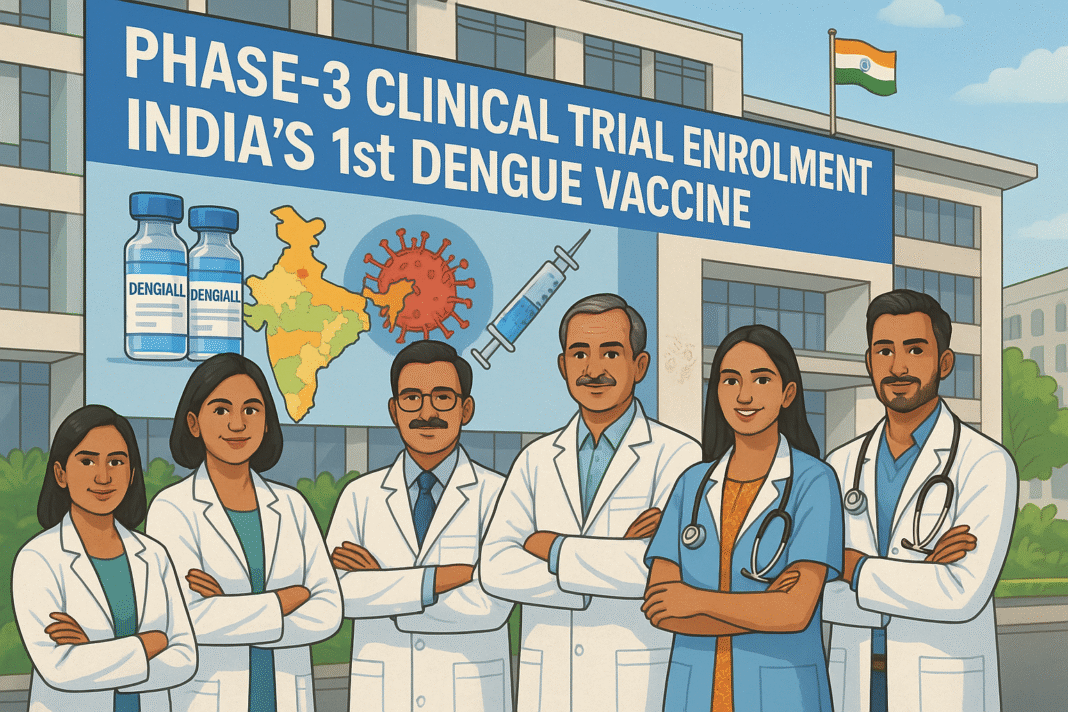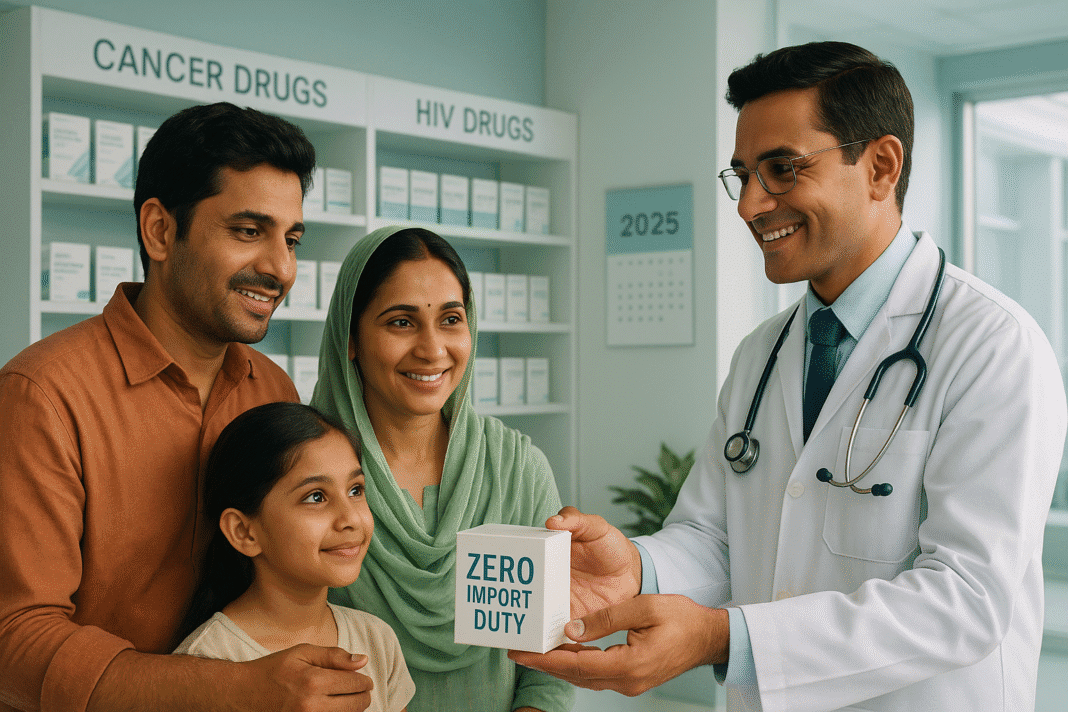Table of Contents
- Background: Dengue in India
- Why a Dengue Vaccine is Urgent
- About DengiAll: India’s First Indigenous Dengue Vaccine
- Clinical Trial Design and Timeline (Corrected)
- Key Institutions Involved
- Science Behind the Vaccine
- Challenges in Vaccine Development
- Public Health Implications
- Expert Insights
- What Comes Next: Steps to Approval and Rollout
- Frequently Asked Questions
- Conclusion
Introduction
India is set to make a significant leap in its fight against dengue with the upcoming launch of the Phase-3 clinical trial enrolment for its first indigenous dengue vaccine, DengiAll. Developed by Panacea Biotec in partnership with the Indian Council of Medical Research (ICMR), this one-shot, tetravalent vaccine aims to address the persistent challenge of dengue fever across the country. The trial is poised to begin enrolling participants by October, marking a pivotal moment in India’s public health landscape.
Background: Dengue in India
Dengue fever, transmitted mainly by the Aedes aegypti mosquito, has long been a public health concern in India. The country frequently ranks among the highest globally for dengue incidence, with outbreaks leading to thousands of cases and hundreds of deaths annually, especially during the monsoon season.
Key Facts:
- India reported over 12,000 dengue cases and nearly 300 deaths in the first quarter of 2024.
- All four dengue serotypes (DENV-1 to DENV-4) circulate in India, complicating both prevention and treatment.
- Children and vulnerable adults are at higher risk of severe disease and hospitalization.
Why a Dengue Vaccine is Urgent
Despite extensive mosquito control efforts, India has not had an approved dengue vaccine or a specific antiviral treatment. The annual burden on healthcare is immense, with outbreaks overwhelming hospitals and causing widespread suffering.
Critical Reasons for a Vaccine:
- Reduces disease burden and hospitalizations.
- Protects the most vulnerable, especially children.
- Lessens economic impact from lost productivity and healthcare costs.
- Aligns with global health priorities to control vector-borne diseases.
About DengiAll: India’s First Indigenous Dengue Vaccine
DengiAll is a tetravalent, live attenuated vaccine developed by Panacea Biotec, using technology licensed from the National Institutes of Health (NIH), USA. It is designed to provide immunity against all four dengue virus serotypes, a crucial feature for effective protection in India.
Unique Features:
- Single-dose regimen for easier mass immunization.
- Targets all four dengue serotypes.
- Manufactured in India, supporting self-reliance and affordability.
Clinical Trial Design and Timeline (Corrected)
Trial Overview
- Type: Multi-centre, double-blind, randomized, placebo-controlled Phase-3 clinical trial.
- Participants: About 10,500 healthy adults.
- Centers: 20 locations across India.
- Leadership: Co-led by ICMR-National Institute of Translational Virology and AIDS Research (Pune), National Institute of Epidemiology (Chennai), and National Institute of Virology (Pune).
Corrected Timeline Table
| Milestone | Date/Status |
|---|---|
| Phase-3 Trial Enrolment Start | October 2025 |
| Target Enrolment Completion | To be announced |
| Two-Year Follow-Up Completion | To be announced |
| Regulatory Submission | Post-follow-up |
| Potential Approval and Launch | After regulatory review |
- The trial will begin enrolment by October 2025.
- Completion dates for enrolment, follow-up, and subsequent milestones will be determined as the trial progresses.
Key Institutions Involved
- Indian Council of Medical Research (ICMR): Lead sponsor and coordinator.
- Panacea Biotec: Vaccine developer and manufacturer.
- National Institute of Translational Virology and AIDS Research (Pune): Lead research institute.
- National Institute of Epidemiology (Chennai): Co-lead for trial design and monitoring.
- National Institute of Virology (Pune): Key collaborator for laboratory analysis.
Science Behind the Vaccine
DengiAll is a live attenuated vaccine, containing weakened forms of all four dengue virus serotypes. This approach is designed to stimulate the immune system to produce antibodies, providing long-term protection against dengue.
How It Works:
- The vaccine introduces weakened viruses to trigger immune response.
- Aims for durable immunity and reduced risk of severe disease.
- The single-dose regimen is a major advantage for large-scale immunization.
Challenges in Vaccine Development
- Serotype Diversity: All four serotypes must be effectively targeted for comprehensive protection.
- Antibody-Dependent Enhancement (ADE): Ensuring the vaccine does not inadvertently worsen disease upon re-infection.
- Population Diversity: Ensuring efficacy and safety across India’s diverse population.
- Operational Scale: Managing recruitment and monitoring of over 10,000 participants at 20 centers.
Public Health Implications
Potential Benefits:
- Lower incidence of dengue outbreaks.
- Reduced hospitalizations and deaths.
- Economic savings from fewer lost workdays and lower healthcare costs.
- Potential for India to become a global leader in dengue vaccine development.
Limitations:
- Continued mosquito control and public awareness are essential.
- Vaccine rollout will be gradual, initially focusing on high-risk areas.
Expert Insights
“The initiation of this Phase 3 clinical trial for India’s first indigenous dengue vaccine marks a critical advancement in our fight against dengue. It reflects our commitment to protecting our citizens from this pervasive disease and underscores India’s capabilities in vaccine research and development.”
— Union Minister of Health & Family Welfare
“The participants enrolled in the Phase-III trial will be followed up for two years. This trial will evaluate the efficacy of this tetravalent dengue vaccine.”
— Dr. Manoj Murhekar, Director, NIE
What Comes Next: Steps to Approval and Rollout
- Begin Enrolment: October 2025.
- Complete Enrolment: Date to be announced as per recruitment progress.
- Two-Year Follow-Up: All participants monitored for safety and efficacy.
- Data Analysis: Comprehensive review of trial results.
- Regulatory Submission: Application for approval after follow-up.
- Approval and Launch: Rollout will follow regulatory clearance.
Frequently Asked Questions
What is DengiAll?
DengiAll is India’s first indigenous tetravalent dengue vaccine, designed to protect against all four dengue serotypes in a single dose.
Who can receive the vaccine?
The current trial includes healthy adults aged 18–60. Recommendations for broader use will depend on trial results and regulatory guidance.
Is the vaccine safe?
Earlier phase trials showed a favorable safety profile. Ongoing monitoring in Phase 3 will further assess safety.
When will the vaccine be available?
If Phase 3 is successful and regulatory approval is granted, the vaccine could be available for public use after the follow-up and review process.
Will the vaccine be affordable?
As an indigenous product, DengiAll is expected to be priced affordably to support mass immunization.
Conclusion
India’s journey toward its first indigenous dengue vaccine is a landmark achievement in public health and biomedical innovation. With Phase-3 clinical trial enrolment set to begin by October 2025, DengiAll offers hope for millions at risk of dengue. The collaboration between ICMR, Panacea Biotec, and leading research institutes highlights India’s growing leadership in vaccine development. As the nation prepares for this next phase, continued vigilance and robust data collection will be key to ensuring the vaccine’s success and impact.




